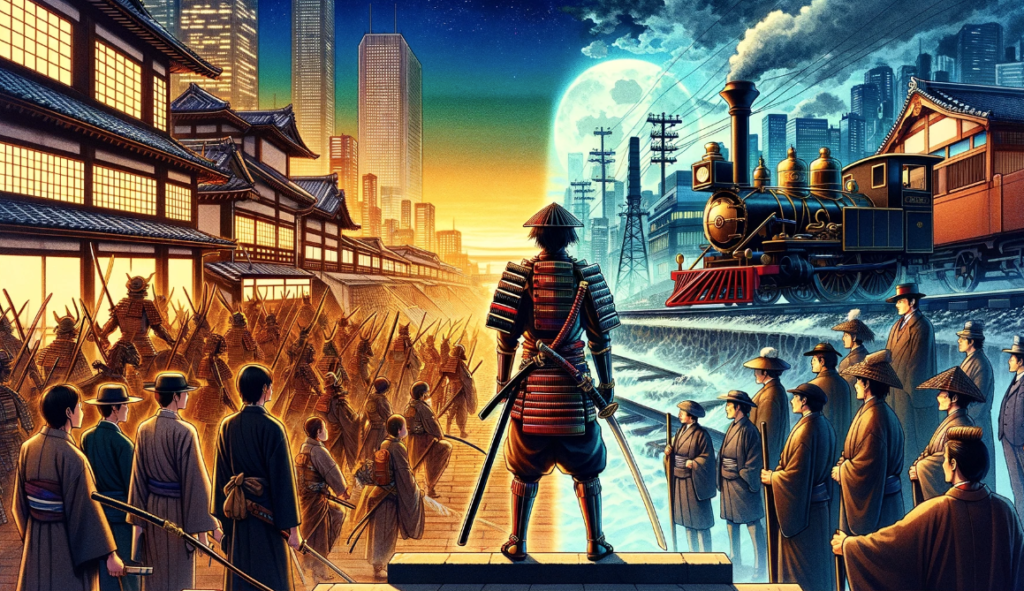
Lesson 22 Meiji Restoration (明治維新)
Topic Question: What were the key factors that led to the Meiji Restoration, and how did it change Japan?
No. 1: Introduction – First, try answering the question yourself.
– The instructor will provide advice on vocabulary, grammar, and expression corrections.
Sample Answer- Let’s read aloud – The instructor will check your pronunciation and accent.
The Meiji Restoration, a pivotal event in Japanese history, marked the end of the Tokugawa shogunate and the restoration of imperial rule under Emperor Meiji in 1868. Key factors leading to this monumental change included internal strife, economic instability, and increasing pressure from Western powers seeking to open Japan to trade and foreign influence. The arrival of Commodore Matthew Perry from the United States in 1853, with his demands for Japan to end its policy of seclusion, significantly contributed to the realization among Japanese leaders that change was imperative to prevent colonization. The Meiji Restoration initiated a period of rapid modernization and westernization, transforming Japan from a feudal society into a modern industrial state. This era saw significant reforms in government, military, education, and industry, fundamentally altering Japanese society, economy, and international standing. Japan’s adoption of Western technologies and administrative systems during the Meiji period laid the groundwork for its emergence as a major world power.
No. 2: Vocabulary Building – 5 Words to Learn and Their Meanings
Pronounce the Words Correctly (Pronunciation Training) + Make Sentences Using the Words Instantly
1. Shogunate (幕府, bakufu): A form of government in Japan ruled by shoguns, or military dictators, from the 12th century until the Meiji Restoration.
“The Tokugawa shogunate was the last feudal Japanese military government which existed between 1603 and 1868.”
2. Modernization (近代化, kindaika): The process of adapting something to modern needs or habits.
“The Meiji Restoration is often cited as a key period of rapid modernization in Japan.”
3. Westernization (西洋化, seiyouka): The adoption of Western ideas, technology, and culture.
“Through Westernization, Japan adopted many aspects of Western technology and governance.”
4. Feudal (封建的, houkenteki): Relating to the social system in medieval Europe, which was similar to the social systems in Japan before the Meiji Restoration.
“Japan’s feudal system was dismantled during the Meiji period, leading to the centralization of power.”
5. Colonization (植民地化, shokuminchika): The act of setting up a colony away from one’s place of origin.
“The threat of Western colonization prompted Japan to embark on a path of rapid modernization.”
No. 3: Key Idiom and Example Sentences
]
“Turning point” (転換点, tenkanten): A moment when a significant change occurs, often leading to new and different developments.
“The Meiji Restoration was a turning point in Japanese history, signaling the end of feudal isolation and the beginning of modernization.”
“The arrival of Commodore Perry’s black ships served as a turning point, forcing Japan to open its doors to the world.”
No. 4: Discussion and Exchange of Opinions on the Sample Answer
Instructor: Reflecting on the sample answer, how do you think the Meiji Restoration balanced the need for modernization with the preservation of Japanese identity and culture?
Student: [Opinions of students]
No. 5: Free Discussion on the Topic
Let’s explore further the effects of the Meiji Restoration on Japan. Discuss the implications of rapid modernization on Japanese society, culture, and the economy. How did Japan manage to transform itself into a modern industrial nation while maintaining its unique cultural identity? Consider the social and political challenges that arose during the Meiji period, including issues related to class, gender, and national identity. Additionally, evaluate Japan’s foreign policy during the Meiji era and its quest for equality with Western powers. How did these ambitions influence Japan’s role in the international community and its relationships with neighboring countries? Finally, discuss the legacy of the Meiji Restoration and its relevance to contemporary Japan. How do modern Japanese view this period, and what lessons can be learned from the Meiji era’s successes and challenges?







